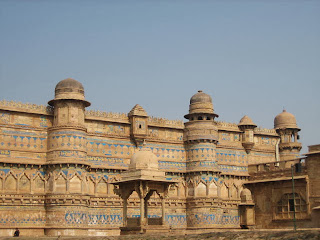If you think Gwalior in Madhya Pradesh is an unassuming city
with nothing much to see except the Gwalior Fort, think again!
The city does not boast of great local food, so better to be safe and stick to the hotel but if you end upto steeping out, the options are very limited (do not go anywhere but the Kwality Restaurant). If you have a sweet tooth, indulge in Bahadura ke laddo and some local Gajjak. Mrignayni, the state emporium is a good place to shop for textile and artifacts.
Big time Neemrana hotels (http://neemranahotels.com)
fan, we decided to explore yet another of their properties for a short break
from Delhi – the 17thC Deo Bagh palace in Gwalior. We arrived in
Gwalior at 3am in the morning thanks to Indian Railways and the hotel staff was
more worried about our safe travel than our families. The Front Desk managed by
Gaurav and Narain was in constant touch with us through our train journey and
we were greeted by smiling faces who wanted to ensure that we get to our rooms
soonest. The weather was kind and we were treated to two wonderful days of
bright sun despite it being the last week of December. This Neemrana property
boasts of heritage sites within the property including a Baradari (a building
or pavilion with 12 doors designed to allow free flow of air) and temples.
Rooms are palatial (as compared to many other Neemrana Fort properties) and all
rooms open into a huge garden – which is wonderful to laze around and play.
The Gwalior Fort is not as grand as those in Rajasthan and
Agra, but its unique design and architecture leaves you wanting for more. The
Fort is situated on top of a hill and since the road is narrow, uphill and
downhill traffic is managed by people sitting at the two ends of the road
connected through a telephone. It is advisable to take a guide if you want to
know some interesting facts about the Fort and its history. The entry ticket to
the Fort also gives entry to two other sites in proximity to the Fort: the
Sas-Bahu ka mandir (or Sahastrabahu Temple) and Teli ka Mandir. Both are
wonderful and should not be missed. The Light and Sound Show at the Fort in the
evenings is a must watch too.
The Jai Vilas Palace has been converted into a museum and is
known for its unique architecture which is a mix of Italian, Tuscan and
Corinithian. The Museum exhibits a collection of antiques belonging to the
Scindia reign which were originally from Italy, France, and Versailles. Two
Belgian chandeliers weighing several tonnes are said to be the largest pair in
the world. The dining room displays a
model railway with a silver train that carried after-dinner brandy and cigars
around the table in crystal coaches. The interesting fact is that the palace
and the Belgian chandeliers are lighted up in the last week of December and are
open to the public (check exact dates before planning a visit) – best time to
go is in the evening to truly enjoy the beauty of the Palace in the lights.
Take a Baggi ride as well and you are all set for your royal extravaganza. The
tickets are easily available at the venue from 5pm, though entry is allowed
only at 6 – unless you can argue with the guards that you are not going to
stand out in the cold for one hour and find your way to a small cafeteria
inside the premises J.
There is also a Sun temple built on the lines of the Konark
Sun Temple – interesting but can be skipped if you are running short on time.
The details about the three things listed above are easily
available on any search you will do on Gwalior. What is not available is
information about two stunning heritage sites – Mitavli and Padhavli (or
Padhawli). These are situated close to each other and approximately 45 minutes
by road from Gwalior (unless your driver like ours had never been there and
therefore decides to take a route through villages and sand stone mining
sites!). These are 9th and 10th C temple ruins that are
breathtakingly beautiful and a MUST VISIT. Thanks to our hotel for recommending
this to us. These has been lying hidden/ forgotten since ages, so very less
information is available about this place. The structure of the Indian
Parliament house (Sansad Bhawan) has an uncanny resemblance to the Mitavli
temple and looks like hugely inspired from the architecture of this temple. If
you go to Gwalior but not visit these places, you would have missed something
stunning.
The city does not boast of great local food, so better to be safe and stick to the hotel but if you end upto steeping out, the options are very limited (do not go anywhere but the Kwality Restaurant). If you have a sweet tooth, indulge in Bahadura ke laddo and some local Gajjak. Mrignayni, the state emporium is a good place to shop for textile and artifacts.
While I had been to Gwalior as a kid, I had no memories of
it and the driving factor behind planning this trip was the Neemrana Deo Bagh
Palace which I wanted to stay in and have a relaxing holiday. We actually realized
that there is so much more to see around Gwalior that we need to come back!
Let’s see when that happens. So, go to Gwalior, stay at Deo Bagh, visit the
Fort, Jai Vilas Palace, Mitavli and Padhavli….and have a lovely holiday!







